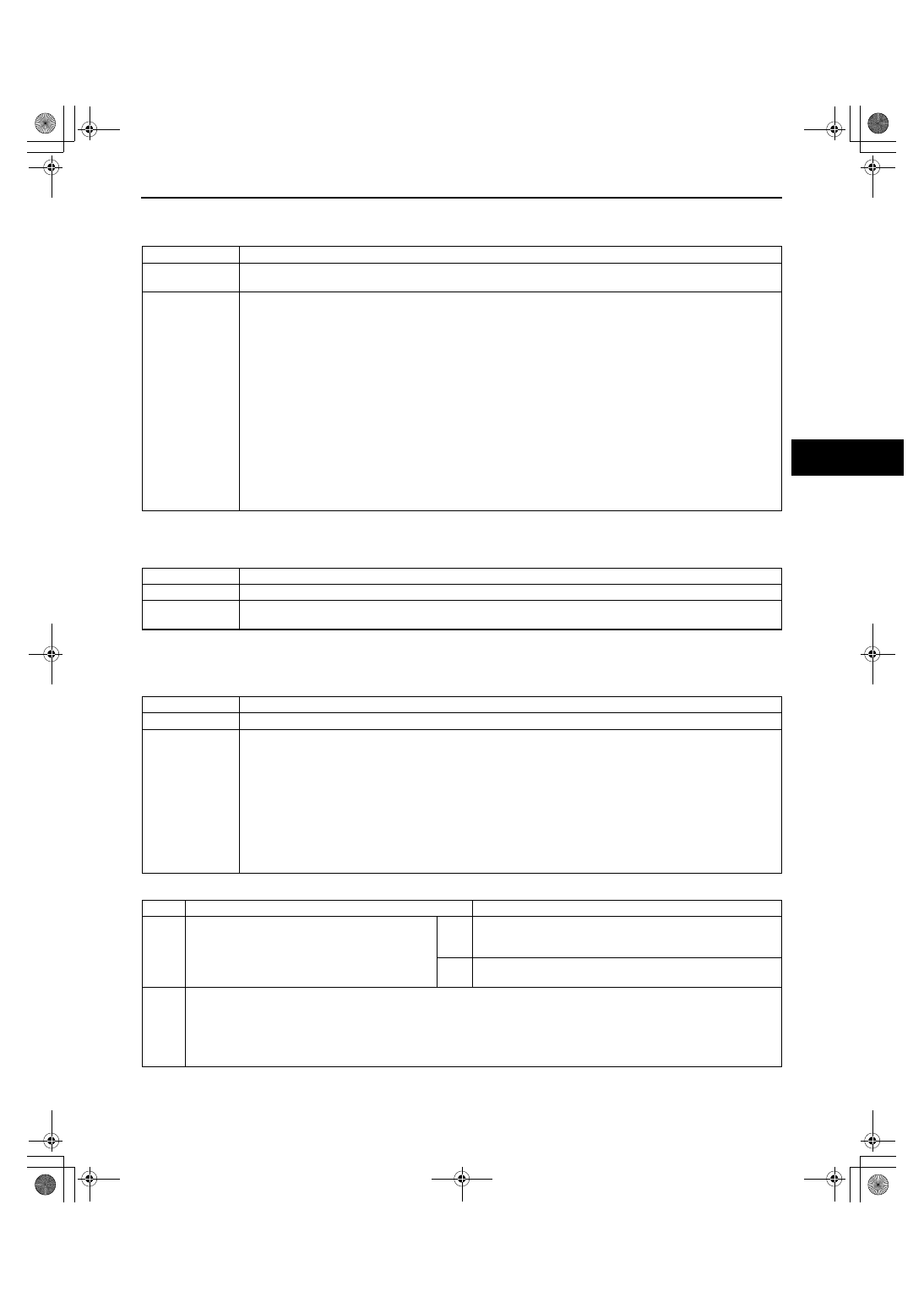Mazda CX 7. Manual - part 251

SYMPTOM TROUBLESHOOTING [AW6A-EL, AW6AX-EL]
05-03–23
05-03
NO.18 EXCESSIVE SHIFT SHOCK IS GIVEN WHEN UPSHIFTING AND DOWNSHIFTING[AW6A-EL, AW6AX-
EL]
id050310802300
End Of Sie
NO.19 EXCESSIVE SHIFT SHOCK ON TORQUE CONVERTER CLUTCH (TCC)[AW6A-EL, AW6AX-EL]
id050310802400
End Of Sie
NO.20 NOISE OCCURS AT IDLE WHEN VEHICLE IS STOPPED IN ALL POSITIONS/RANGES[AW6A-EL,
AW6AX-EL]
id050310802500
Diagnostic procedure
End Of Sie
18
Excessive shift shock is given when upshifting and downshifting
DESCRIPTION
• Excessive shift shock is felt when depressing the accelerator pedal at upshifting.
• During cruising, excessive shift shock is felt when depressing accelerator pedal at downshifting.
POSSIBLE
CAUSE
• Shift shock may worsen when the fail-safe is operating. The shift shock may worsen if the accelerator
pedal position sensor, APP sensor, input/turbine speed sensor, or VSS signal malfunctions.
— Clutch slippage, burnt (C1 clutch, C2 clutch, C3 clutch, B1 brake)
• Line pressure low, high
• Incorrect accelerator opening signal
• VSS malfunction
• Input/turbine speed sensor malfunction
• TFT sensor malfunction
• Shift solenoid C malfunction
• Shift solenoid D malfunction
• Shift solenoid E malfunction
• Line pressure control solenoid malfunction
• TCC control solenoid malfunction
• Shift solenoid F malfunction
• Body GND and sensor GND malfunction
• Control valve body malfunction
— Poor hydraulic operation (Malfunction in range change)
19
Excessive shift shock on torque converter clutch (TCC)
DESCRIPTION
• Strong shock is felt when the TCC is engaged.
POSSIBLE
CAUSE
• The troubleshooting flow is the same as No.16 “JUDDER UPON TORQUE CONVERTER CLUTCH
(TCC) OPERATION”.
20
Noise occurs at idle when vehicle is stopped in all positions/ranges
DESCRIPTION
• Transaxle is noisy in all positions and ranges when the vehicle is idling.
POSSIBLE
CAUSE
• The malfunction is in the pressure solenoid or oil pump which causes a high-pitched noise to be emitted
from the transaxle at idle.
Note
• If a noise is emitted during shifting only, the malfunction is in the C1 clutch, C2 clutch, C3 clutch
or B1 brake.
• If a noise is emitted during shifting at certain gears only or during deceleration only, it is gear
noise.
• Before following the troubleshooting steps, make sure that the Automatic Transaxle On-Board
Diagnostic and Automatic Transaxle Basic Inspection are conducted. (See 05-03-3 BASIC
INSPECTION[AW6A-EL, AW6AX-EL].)
STEP
INSPECTION
ACTION
1
• Inspect engine condition.
• Is there any engine concern (e.g. Rough
idle)?
Yes
Go to appropriate symptom troubleshooting.
(See 01-03-5 ENGINE SYMPTOM
TROUBLESHOOTING[L3 WITH TC].)
No
Replace basic inspection and repair or replace any
malfunctioning parts according to the inspection result
2
• Verify test results.
— If normal, return to the diagnostic index to service any additional symptoms.
— If malfunction remains, inspect the related Service Bulletins and/or On-line Repair Information and perform
repair or diagnosis.
• If the vehicle is repaired, troubleshooting completed.
• If the vehicle is not repaired or additional diagnostic information is not available, replace the TCM.
1871-1U-06B(05-03).fm 23 ページ 2006年3月15日 水曜日 午前11時19分